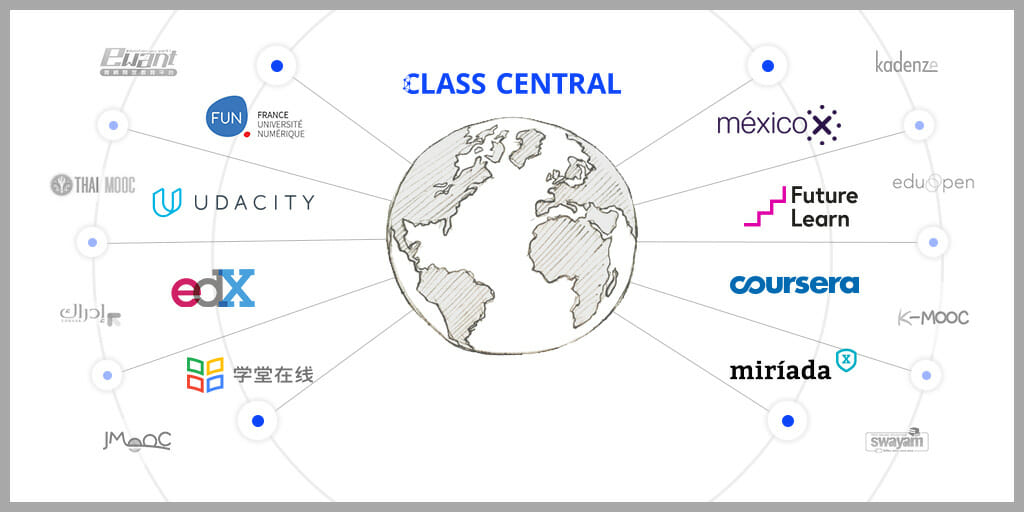
Articles
Interviews
What Does ‘MOOC’ Mean Anymore? The Latest from Class Central
By Henry Kronk
February 16, 2018
Last month, Class Central put out their latest report on Massive Open Online Courses. “A Product at Every Price: A Review of MOOC Stats and Trends in 2017,” authored by Class Central founder Dhawal Shah, describes the ongoing shift in the MOOC space.
Many findings are hardly surprising: the number of MOOCs continues to grow; due to shifts in MOOC scheduling practices, more MOOCs are available for enrollment at any given time; the market has continued to diversify in terms of products and price points; and paid content has continued to increase, while free MOOCs reduce in number.
But many unexpected events have come about as well. For example, the number of new learners actually decreased in 2017. 20 million people signed up for their first MOOC last year. In 2016, that figure stood at 23 million.
This doesn’t so much indicate a decline in popularity. Instead, it reflects another trend: MOOC providers have begun to find their audience. MOOCs have moved away from casual learning (that brought with it low completion rates and little money) to training and retraining professionals.
Where Are We Now?
MOOCs are beginning to really diversify in terms of form and subject matter. Chabad.org has an offering that teaches the nuances of Jewish prayer. The French political party En Marche put out a MOOC to foster political engagement at the community level. Dublin City University launched a MOOC to reconnect the descendants of the Irish Diaspora. Meanwhile, Udacity is becoming more of a for-profit vocational trainer than a MOOC provider. The number of price points are increasing at several other providers. And still, edX stays more or less true to MOOC form.

Isn’t the term MOOC losing its essence? It seems as broad as the phrase ‘online course’ at this point.
“This is a great question and something that I struggle with constantly – how to onboard new learners when there is so much variation in terms used as well as services across different providers,” Class Central CEO Dhawal Shah said via email. “It can be really daunting to be bombarded with so many new terminologies.”
“MOOCs never really meant MOOCs. When the term was first coined back in 2008, the creators meant something else. And that’s why we now have more definitions like cMOOCs and xMOOCs.”
(xMoocs refer to a traditional university course-turned-MOOC where every participant is either a teacher or a learner. cMOOCs adopt more of a flipped learning approach where a group of people learn together via a system of forums, online communities, and social media. Still, these terms certainly don’t begin to describe the variety of MOOCs.)
“Even the big MOOC providers, hesitate to call themselves a MOOC provider and are not particularly fond of the word,” Shah said.
“So it’s difficult to say a term is losing its essence when it never really had a proper definition.”
“It’s more of a marketing term nowadays and that’s why many content providers are trying to jump on it. But the providers with a more established brand want to move away from it and create their own terminology, i.e Nanodegrees, MicroMasters, Specializations etc.”
Massive Misconceptions
While Class Central continues to compile and track each and every MOOC, many have struggled to keep up with where MOOCs are currently at. A story appeared in Wired last month proclaiming “Online courses don’t work but education can still be disrupted.” It used a c. 2013 argument against MOOCs, citing the low completion rates of free MOOCs and ignoring the explosion of paid content. More recently, an Op-Ed appeared in the New York Times about how “online courses” leave certain students behind and spoke only about struggling high school learners. Forbes education writer Ryan Craig’s recent post urges metaphorical seat belts for all online education.
“Unfortunately “thought leadership” pieces about MOOCs/online education always have been poor and even get the most basic facts wrong,” Shah said. “But the good news is, learners, don’t really learn about MOOCs from the articles like those you mentioned. The stalling is a direct result of shifting priorities of MOOC providers towards more paying users and I am more worried about that than anything else.”
“On our end, we constantly try to write about the changes in the MOOC space to help learners keep up with what a “MOOC” means and how different providers are shifting their policies. We are soon going to launch a comprehensive help section including provider-specific guides.”
Check here for the full report.









This article is very helpful. Keep posting, please 🙂